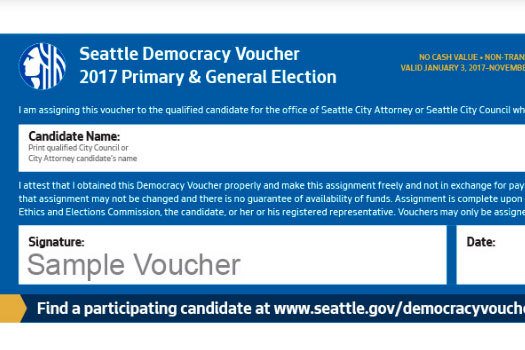Little slips of democracy are on their way to a mailbox near you.
On Tuesday, Seattle’s grand experiment with providing eligible residents $100 worth of vouchers that municipal candidates can use to fund their campaigns will begin going out.
The idea behind the vouchers is that by giving ordinary people money to spend on elections, candidates will devote more time catering to them rather than deep-pocketed donors and special interests. The initiative was bankrolled by a nationwide group of wealthy donors who are experimenting with ways to counter the influence of money in politics in the wake of the 2010 Citizens United ruling.
In a press release Thursday, Fuse—a progressive group that supported I-122, which created the program—presented the vouchers as all the more important following the presidential election. “With little relief expected from the Supreme Court under President-elect Donald Trump, it’s up to cities like Seattle to demonstrate new ways to reduce the power of big money.”
In order to receive the vouchers, candidates will have to get $10 donations from 400 people—a way to keep vouchers, which are funded through a small levy—from going to crank candidates. Candidates who redeem the vouchers will also have to agree to more stringent campaign finance rules.
Meanwhile, the Seattle Times editorial board continued its naysaying on the plan. In an editorial published in Thursday’s edition, the paper owned by the Blethens—a wealthy, white family—raised the prospect that special interest groups could break the law and “bundle” the vouchers to increase their clout in elections. The current, at times unseemly state of affairs in local elections goes unmentioned.
As Casey Jaywork reported for us earlier this month, council candidate Jon Grant is already on the hunt for his 400 donors so he can start reaping the voucher bounty, and claims that I-122 led well-financed Councilmember Tim Burgess to drop out of the race. Burgess denies the vouchers played a part.








